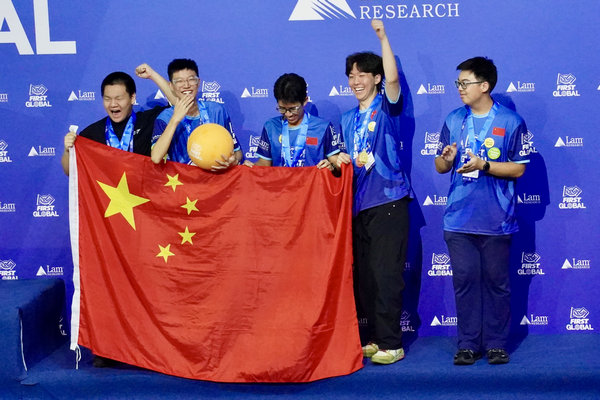

Athens, a city in Greece steeped in Olympic history, once again welcomed a global gathering of young talent last month. This time, it wasn't athletes but young innovators representing 193 countries and regions, who converged for the 2024 FIRST Global Challenge.
Representing Team China in this annual international robotics competition was a group of 13 senior middle school students, who demonstrated their technological ingenuity in an arena of friendly competition and intercultural exchange.
After 18 matches over three rounds between Sept 26 and 29, the team brought home multiple accolades. They clinched gold as a member of the FIRST Global Winning Alliance alongside Moldova, Madagascar and the Cook Islands, the second consecutive year Team China has won the prize. They also won bronze in the Albert Einstein Award for FIRST Global International Excellence, and bronze in the FIRST Global Grand Challenge Award.
Hosted in a different country each year, and this year in its eighth iteration, the FIRST Global Challenge invites youth from around the world to represent their country or region. Each team programs and builds a robot to complete tasks related to a pressing global issue, such as climate change or energy production.

This year's theme was Feeding the Future, which tasked the competitors to design robots capable of simulating sustainable food production processes, and come up with technological solutions to improve global food security.
"If we hope to protect the natural environment and reduce the pressure on food production, we must conserve food and develop more sustainable ways of crop cultivation," says Zhang Junshu, a 16-year-old student at the Beijing National Day School, and a member of the Chinese team.
Another member, 17-year-old Zhao Wenjin, from the High School Affiliated to Renmin University of China, believes that robotics has vast potential use in agriculture and livestock farming. "Robots can substantially increase both quantity and quality of food products, contributing to sustainable food production. Robotics and artificial intelligence technology can also play a crucial role in reducing waste," Zhao says.
The students designed a robot shaped like a 50-centimeter cube to complete the task. In the matches, the team was required to make their robot transport green balls, representing energy, and blue balls, representing water, into designated containers. When both were placed in the correct containers, they produced yellow balls representing food, which then had to be transported to another designated area to score points.
Zhao says that the most impressive moment came in the final stage of each match, when the robots had to mount a balancing platform for bonus points. The more robots that successfully mounted, the higher the bonus points for both alliances, which means that collaboration was necessary if all robots were to balance on the platform successfully.
"Before each match, we would discuss tactics and arrangements with our opponents. I remember that before the final match, our alliance and our opposing alliance cheered each other on, hoping that we could all successfully get onto the platform," Zhao says.